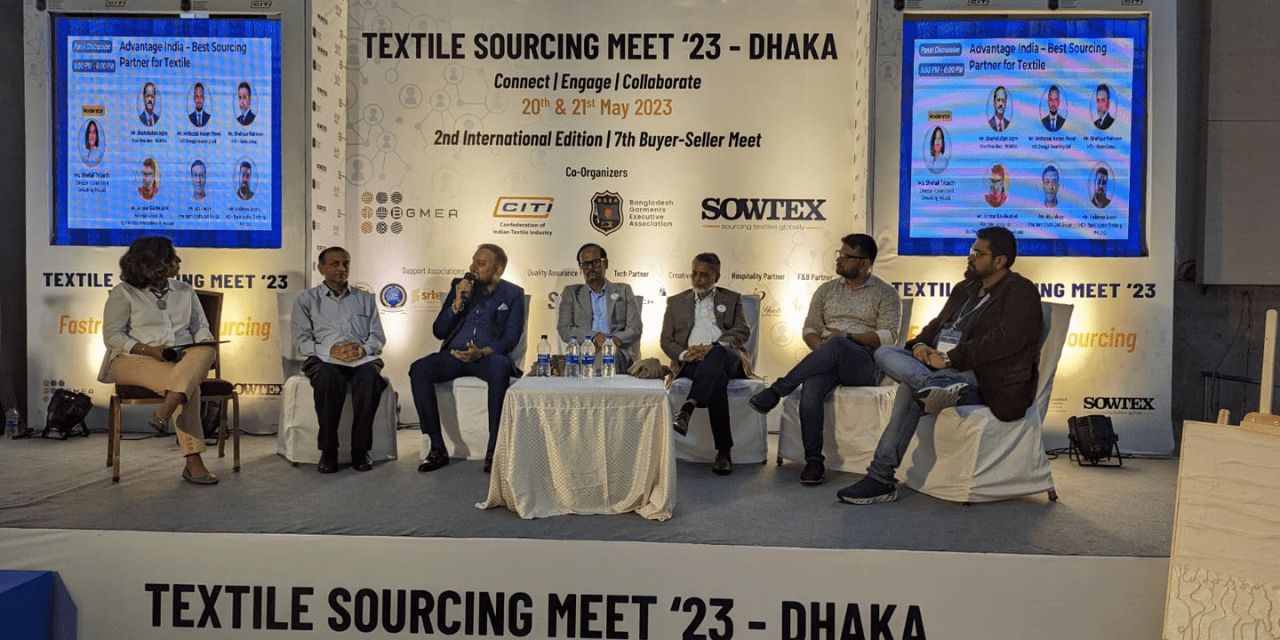Bangladesh has become a major force in the global textile and apparel industry in recent years, with a booming ready-made garments (RMG) sector greatly boosting its economic expansion. Insiders in the sector have suggested looking into the possibility of importing raw materials from India in order to maintain this momentum and decrease reliance on a single supplier. By diversifying supply chains, shortening lead times, and lowering dependency on China, this proposal seeks to create a situation where Bangladesh and India may benefit equally.Experts highlighted the potential advantages of sourcing raw materials such as during a panel discussion at the Textile Source Meet 2023 in Dhaka, which was jointly organised by the Bangladesh Garment Manufacturers and Exporters Association (BGMEA), the Confederation of Indian Textile Industry (CITI), the Bangladesh Garment Executive Association, and Sowtex. India-sourced cotton, yarn, clothing, dyeing chemicals, and equipment.
The occasion offered industry participants a forum to discuss the opportunities and difficulties presented by this tactical choice.Vice-president of BGMEA Shahidullah Azim emphasised the relevance of India as the second-largest provider of raw materials to Bangladesh’s RMG sector, behind China.
Azim acknowledged India’s proximity as a neighbouring nation and discussed the steady transition away from relying on Chinese imports and towards growing sourcing from India due to its quicker lead times. To ensure smooth trade between the two countries, he emphasised the necessity of resolving port-related issues and reducing traffic at the Petrapole-Benapole border crossing.
Azim emphasised the significance of developing a thorough roadmap that is in line with Bangladesh’s lofty goal of attaining $100 billion in yearly RMG exports by 2030. This goal calls for a larger supply of yarn, cotton, and fabrics, as well as more exports to unorthodox markets. Additionally, industry participants are urged to invest in high-end, value-added products to maintain export growth in the face of the current uncertainty in the global economy.
Shafiqur Rahman, managing director of HAMS Group, emphasised the special benefits provided by Indian raw materials in Bangladesh’s RMG sector throughout the debate.
The historical connection, cultural resemblances, and shorter lead times were mentioned as important aspects that make India an appealing sourcing location. Rahman emphasised that Bangladesh has been buying machinery and dye chemicals from India in addition to yarn, textiles, and raw cotton, further solidifying the two countries’ trading relations.
The managing director of Shovon Islam Sparrow Group, invited participants to witness the transformation of Bangladesh’s factories, emphasizing their world-class standards, modern packaging techniques, automation, and updated software systems.
Islam encouraged attendees to explore design collaboration opportunities and emphasized the need for joint efforts and investments from both Bangladesh and India to overcome any barriers hindering this collaboration.
The panel discussion recognized the sincere efforts of the governments of India and Bangladesh in resolving trade-related challenges and fostering a conducive environment for smooth trade.
Fazlee Shamim Ehsan, vice-president of the Bangladesh Knitwear Manufacturers and Exporters Association (BKMEA), along with industry insiders from both countries, contributed valuable insights to the discussion, underscoring the significance of this potential partnership for the textile and garment industries in Bangladesh and India.

